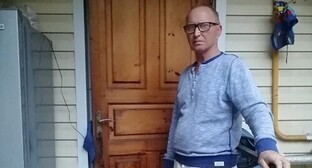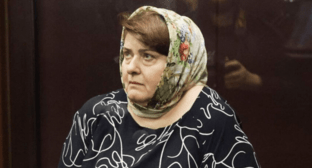30 August 2021, 21:59
Week in the Caucasus: review of main events of August 23-29, 2021
Damage and casualties as a result of heavy rains in Dagestan; detention of Pankisi Gorge residents during a special operation; adoption of the Armenian government’s programme amid the boycott of the opposition, – see the review of these and other events in the Caucasus during the week of August 23-29, 2021, prepared by the “Caucasian Knot”.
Damage and casualties as a result of heavy rains in Dagestan
On August 23, powerful downpours occurred in the mountainous regions of Dagestan. In the village of Khadjalmakhi in the Levashi District, a car with two persons was carried away by a mudflow, and in the village of Kouppa, a Gazel car with a driver met the same fate. On August 26, a body of the Gazel car driver and a body of a woman from the Levashi District were found. The body of the woman’s son was found on August 27. On August 23, in the Gunib District, a flooded river blocked tourists in the Karadakh Gorge, and 34 people were evacuated from there. Two more persons – residents of Moscow and Saint Petersburg – disappeared. On August 25, a body of one of the tourists was found.
Besides, a mudflow in the Levashi District damaged a residential building, several sections of roads, bridges, and a gas pipeline. Residents of four villages were left without gas supply. The emergency regime has been introduced in the Levashi District. The disaster also caused damage to residents of the village of Gubden in the Karabudakhkent District, where mudflows destroyed a bridge and a section of the water supply system.
Detention of Pankisi Gorge residents during special operation
On August 24, the Georgian State Security Service conducted a special operation in the villages of Koreti and Duisi in the Pankisi Gorge and detained at least five local residents, accusing them of involvement in the “Islamic State” (IS, a terrorist organization, banned in Russia by the court, – note of the “Caucasian Knot”). The detainees are from 18 to 20 years old. According to the law enforcers’ version, they swore allegiance to the terrorist organization. Residents of the Pankisi Gorge believe their fellow countrymen are not guilty. According to the villagers, the detainees went to Turkey to work and could have moved to Syria earlier if they wanted to become militants. Malkhaz Machalikashvili, a MP candidate, suggested that the special services were imitating the fight against terrorism. He believes that before the elections, the authorities would promise to release the guys or mitigate their sentences in exchange for the teip (family clan) to vote for them. On August 26, the court arrested the detainees. All of them pleaded not guilty.
Preparations for elections in Southern Russia
Southern Russia continues the preparations for the elections in September. On September 19, the single voting day, voters are to elect the heads of four regions of the North-Caucasian Federal District (NCFD), including Chechnya, Dagestan, Karachay-Cherkessia, and North Ossetia. There will also be the voting on the elections of members to the State Duma. The voting will take place on September 17, 18, and 19. The idea of a three-day voting has provoked criticism. So, participants of the pickets held in Volgograd on August 28 claimed that such a method of voting provided an opportunity for falsifications. Local supporters of Alexei Navalny have set up the “Dozor” (Watch) anti-corruption headquarters to train observers to control the elections of members to the State Duma.
On August 21, the media started campaigning for the elections. In Dagestan, the election campaign is not obvious, as the authorities are not interested in high voter turnout, analysts suggest. Members of regional branches of political parties pointed to the difficulty of holding elections amid the pandemic.
Protests of Nalchik residents against relocation of bus station
After the new “Severny” bus station was built in Nalchik, the authorities decided to close the suburban bus station in the city centre. Many residents of Kabardino-Balkaria did not like the authorities’ decision. Activists sent an appeal, signed by more than 2500 people, to Kazbek Kokov, the leader of the Kabardino-Balkarian Republic (KBR). In their appeal, authors claim that the termination of the bus station in the centre of Nalchik will create inconvenience for passengers and increase travel time and travel costs. On August 20, a spontaneous rally took place near the closed bus station, when people from other cities of the republic could not leave home. On August 23, merchants from the market in Nalchik held a protest action: they also demanded from the authorities to cancel the decision to move the bus station. On August 24, the Nalchik City Mayoralty announced that a public park would be built on the place of the bus station and a transport interchange would be arranged to relieve traffic in the city centre. Officials assure that convenient routes will be organized for passengers. However, opponents of the relocation of the bus station do not trust the officials. On August 24, the territory of the bus station was surrounded by concrete blocks, but drivers of minibuses broke them and resumed traffic. On August 25, another rally took place in front of the Government House of the KBR. The protestors claimed they had to work in the markets and use the suburban bus station, so they did not want it to be closed.
Adoption of Armenian government’s programme amid boycott of opposition
On August 27, members of the National Assembly of Armenia from the “Civil Contract” faction voted for the government programme presented by Prime Minister Nikol Pashinyan. The voting took place amid a boycott of the opposition and a protest of journalists who demanded to lift restrictions on media workers when working in parliament and giving more freedom to the press. There were clashes between MPs. During a clash which occurred on August 25, journalists were forcibly taken out of the press box and banned from filming what was happening. Political analyst Naira Airumyan suggests that fights and clashes in the Armenian parliament diverted people’s attention from the government’s political programme, which the ruling faction and the opposition were not ready to discuss in detail. All political forces in the Armenian parliament are aimed at confrontation with each other and are not able to come to an agreement, political analyst Saro Saroyan believes.
This article was originally published on the Russian page of 24/7 Internet agency ‘Caucasian Knot’ on August 30, 2021 at 09:24 am MSK. To access the full text of the article, click here.




